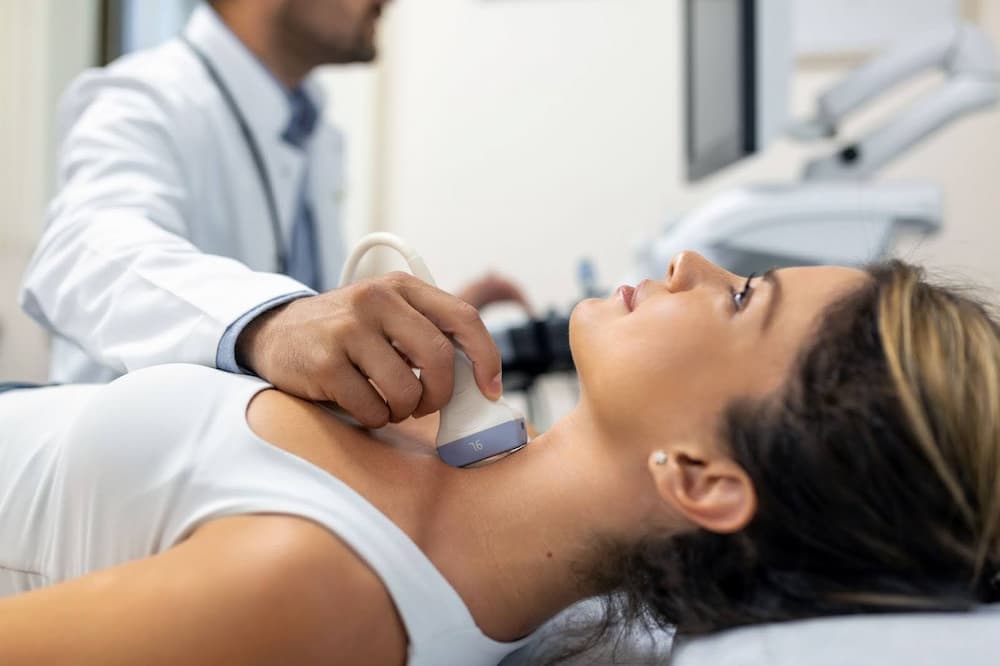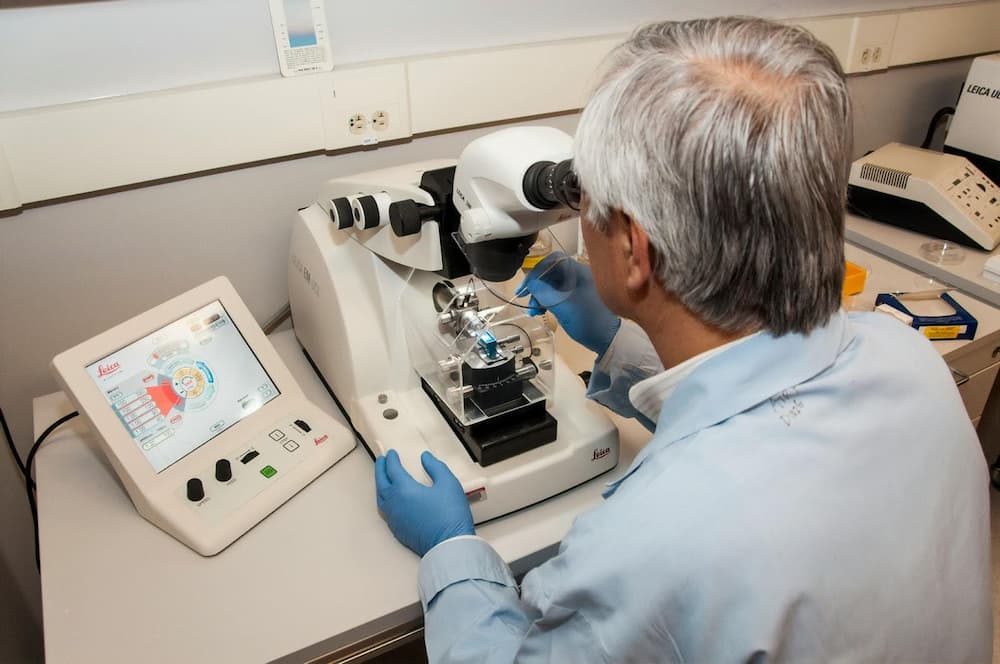The thyroid gland produces important hormones vital to living normally. But when it doesn’t make enough, it causes issues that make daily life harder to cope with. This condition is called hypothyroidism, and the only approved therapy for it involves taking oral thyroid hormone medicine every day for the rest of your life.
That’s a huge commitment to make, and it’s why you may be looking for alternative treatments. Stem cell therapy for hypothyroidism might be the effective answer to the problem.
What Is Hypothyroidism?
Hypothyroidism (underactive thyroid) is a condition in which the thyroid gland produces too little or no thyroxine at all. The thyroid is a small, butterfly-shaped gland located in the neck.

Thyroxine is a hormone responsible for metabolism. It regulates how most of our body uses energy, or how active we are. When this hormone is deficient, it causes the body and its many systems to “slow down.”
This is best demonstrated by taking a look at the symptoms of an underactive thyroid:
- Weight gain
- Muscle weakness
- Muscle and joint soreness or pain
- Fatigue
- Cold intolerance
- Reduced heart rate
- Depression
- Constipation
- Changes in menstrual cycle
- Thinning hair
- Dry skin.
Studies suggest that around 65% of thyroid hormone production is influenced by genetics. However, other factors like environmental influences, lifestyle choices, insufficient intake of iodine through a diet, or medications like lithium also play a role in the development of hypothyroidism.
The only approved management is thyroxine replacement, in the form of tablets taken orally every day.
Get a free online consultation
Contact us to learn about the expected results of stem cell treatment for peptic ulcer disease, its cost and duration, and what the treatment involves.

Medical Advisor, Swiss Medica doctor
How Do Stem Cells Work for Hypothyroidism Treatment
When a person starts taking thyroxine tablets, they have to take them for the rest of their life. Many patients start on the supplements and eventually seek out a more permanent alternative. Stem cell treatment for hypothyroidism can be the solution, and it is important to understand how it works.
The most common cause of hypothyroidism is an autoimmune condition called Hashimoto’s disease, during which the body’s immune system attacks and destroys the gland. This reduces the number of thyroid follicular cells — the cells that make thyroxine — leading to an underactive thyroid.
This is where stem cell therapy for hypothyroidism comes in. In Swiss Medica, only mesenchymal stem cells (MSCs) are used in therapy.
Mesenchymal Stem Cells (MSCs) are adult stems found in various body tissues. They play a crucial role in tissue maintenance and repair. This type of cells can be harvested from the patient’s own body or from the donor’s body, which reduces ethical concerns.
MSCs can differentiate into different cell types, including thyroid cells. They have shown potential in reducing inflammation and regulating the immune system, making them valuable for treating autoimmune thyroid diseases like Hashimoto’s.
What Improvements Do Patients Get?
Patients who undergo stem cell treatment for hypothyroidism at Swiss Medica will usually see many symptoms improve.
Some of the changes that may be noticed include the following:
- Weight returns to normal levels
- Improved tolerance to cold
- Bowel movements are restored to normal frequency
- Increased muscle strength
- Increased energy levels
- Restoration of normal heart rate
- More regular menstrual cycles
- Improved mood and emotional state.
Of course, it is important to remember that the improvements that can be seen after stem cell therapy for hypothyroidism depend on the symptoms the patient presents with. Moreover, although the treatment is promising, stem cell therapy is still being researched for effectiveness. Due to its complexity, it should only be conducted by trained professionals.
Safety Issues & Side Effects
One of the biggest worries about stem cell treatment for hypothyroidism is the safety of the procedure, especially as it is yet to be widely accepted in conventional medical circles.

Fortunately, when prepared under professional and sterile conditions, the risk of adverse events is very low. The most common side effect that tends to be seen is low-grade fever, which usually needs no intervention for resolution.
What Does the Treatment Program Include
For effective stem cell treatment of hypothyroidism, it is essential to take a holistic approach. The treatment program usually does not only focus on the administration of the cells but also on other aspects of treatment.
The treatment process is personalized for each patient and their unique presentation. Therapy may generally follow a pattern, such as:
- Consultation with the healthcare team, including endocrinologists, nutritionists, etc.
- Physical examination, tests, and other diagnostic procedures that may be required
- Stem cell administration.
- Pharmaceutical treatment/supplementation, when required.
- Physiotherapy.
- Follow-up care after completion of treatment duration.
Cost of Stem Cell Therapy for Hypothyroidism
Stem cell therapy is on the cutting edge of medical interventions. It can potentially treat or mitigate the symptoms of diseases that are traditionally difficult to manage. As a result, his procedure is generally expensive.
However, the pricing for stem therapy for hypothyroidism varies based on the severity of the condition, comorbidities, the predicted duration of their stay, etc. It can be anywhere between 7 and 25 thousand euros.
The most accurate way to know the cost of this treatment is to contact the clinic for a free online consultation. This will provide answers to any concerns that may arise.
Contact us
Get a free online consultation with a medical expert of the clinic to discuss the expected results for your case of the disease, the procedure, the cost, and the duration of the treatment.

Medical Advisor, Swiss Medica doctor
List of References
Liu, X., Zheng, P., Wang, X., Dai, G., Cheng, H., Zhang, Z., Hua, R., Niu, X., Shi, J., & An, Y. (2014). A preliminary evaluation of efficacy and safety of Wharton’s jelly mesenchymal stem cell transplantation in patients with type 2 diabetes mellitus. Stem cell research & therapy, 5(2), 57. https://doi.org/10.1186/scrt446
Ma, R., Shi, R., Morshed, S. A., Latif, R., & Davies, T. F. (2020). Derivation and 97% Purification of Human Thyroid Cells From Dermal Fibroblasts. Frontiers in endocrinology, 11, 446. https://doi.org/10.3389/fendo.2020.00446
Cao, Y., Jin, X., Sun, Y., & Wen, W. (2020). Therapeutic effect of mesenchymal stem cell on Hashimoto’s thyroiditis in a rat model by modulating Th17/Treg cell balance. Autoimmunity, 53(1), 35–45. https://doi.org/10.1080/08916934.2019.1697689
Kurmann, A. A., Serra, M., Hawkins, F., Rankin, S. A., Mori, M., Astapova, I., Ullas, S., Lin, S., Bilodeau, M., Rossant, J., Jean, J. C., Ikonomou, L., Deterding, R. R., Shannon, J. M., Zorn, A. M., Hollenberg, A. N., & Kotton, D. N. (2015). Regeneration of Thyroid Function by Transplantation of Differentiated Pluripotent Stem Cells. Cell stem cell, 17(5), 527–542. https://doi.org/10.1016/j.stem.2015.09.004
Institute of Medicine (US) Committee on Medicare Coverage of Routine Thyroid Screening; Stone MB, Wallace RB, editors. Medicare Coverage of Routine Screening for Thyroid Dysfunction. Washington (DC): National Academies Press (US); 2003. 2, Pathophysiology and Diagnosis of Thyroid Disease. Available from: https://www.ncbi.nlm.nih.gov/books/NBK221541/
Babić Leko M, Gunjača I, Pleić N, Zemunik T. Environmental Factors Affecting Thyroid-Stimulating Hormone and Thyroid Hormone Levels. International Journal of Molecular Sciences. 2021; 22(12):6521. https://doi.org/10.3390/ijms22126521
MD, Endocrinologist, Pediatrician, regenerative medicine specialist, R&D director







